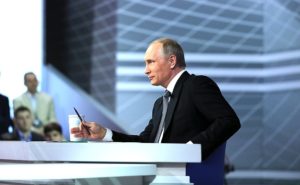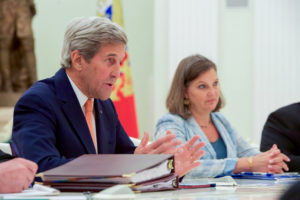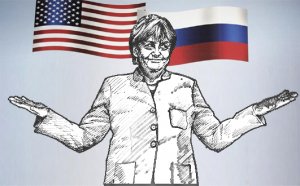
Gilbert Doctorow, Ph.D.
Gilbert Doctorow is the European Coordinator of The American Committee for East West Accord Ltd and a Senior Research Fellow of the American University in Moscow. His most recent book Does Russia Have a Future? was published in August 2015.
The harsh U.S. rhetoric denouncing Russian President Putin is having the adverse effect in Russia of strengthening hard-line "populists” in upcoming elections who think Putin’s ruling party is too soft on the U.S., reports Gilbert Doctorow.
Last week, Hillary Clinton told reporters on her campaign plane that the Russians are trying to disrupt the U.S. elections to discredit the process and sow discord among Americans. This goes one step further than her previous charges of Russian influence thought the "Kremlin’s candidate,” Donald Trump, or still earlier, the claim that the Democratic National Committee’s server had been hacked by intelligence services reporting to Vladimir Putin. Of course, all these charges were made without proof.
Meanwhile, in the Russian Federation, where folks are facing their own national elections on Sept. 18, a kind of mirror-image denunciation of foreign (meaning American) interference in their domestic politics is also heard from many in the Russian Establishment.
In the past week, the widely respected Levada Center, best known for its public opinion polls, found itself accused by federal authorities of being a "foreign agent” due to revenues it earns from multinational companies for whom it does marketing studies. Its director said that if the label sticks, the Center may be forced to close its doors.
Also, this past week, the International Republican Institute (IRI), a "non-governmental organization” chaired by Sen. McCain and with an operation in Moscow, was declared a threat to Russian national security and ordered to halt its activities in Russia. (Most of IRI’s money comes from the U.S. Agency for International Development, the U.S. State Department and the U.S.-government-funded National Endowment for Democracy, whose president has called for Russian President Vladimir Putin’s ouster.)
But the way the elections in both the U.S. and Russia are taking shape has considerably more in common than these complaints of outside interference. I see a much bigger common factor in the growing, possibly decisive role of populism in both Russia and the U.S. this year.
In the United States, the rise of populism and its possible victory at the polls in November over the opposition of the political establishment of the Democratic and Republican parties have been obvious from the start and throughout the progression of the candidacy of Donald Trump.
In a recent full-page analytical article headlined, "The Trump Phenomenon,” the Rossiiskaya Gazeta, one of Russia’s most serious and well-written daily newspapers, identifies economics as the driving force behind the populist wave that Trump is riding. Specifically, he made himself a voice of the millions of working-class Americans who have suffered over the last 30 years from the deindustrialization and outsourcing which have been part and parcel of the globalization that successive U.S. administrations from the two mainstream parties have actively promoted through "free trade” deals.
Meanwhile, the foreign policy component of Trump’s agenda gives voice to the views of the majority of Americans who consistently over the past 30 years have said they want their country to stop being the world’s policeman and to pursue more peaceful policies by acting in consensus as an equal partner with the world’s other major powers.
This resistance to the Establishment’s insistence on U.S. global dominance has been a constant feature of Pew polls, including one last spring that found nearly six in ten Americans (or 57 percent) feeling that the U.S. should deal with its problems and other countries should deal with their own. Only 37 percent thought the U.S. should help other countries deal with their problems.
But this attitude has been dismissed by the foreign policy establishment as revealing nothing more than public ignorance of the world’s dangers and complexities, a preoccupation with consumerism, and an unwillingness to accept hardships for the common security by exercising global leadership.
Consequently, one can summarize and conclude that Donald Trump’s planned foreign policy has deep populist roots. His proposals to find dialogue with Russia on common security interests are neither a sign of his being "Putin’s candidate” or of arbitrarily and capriciously adopting a position solely to run against what the Establishment is saying for the sake of drawing attention to himself.
Hard-line Russian ‘Populism’
By contrast, the curious and important thing to note about Russian populism is that it is driven far less by economics, although the Russian citizenry is hurting badly from the third year of recession that came out of the fall in energy prices and Western sanctions over Crimea and Ukraine.

Russian President Vladimir Putin answering questions from Russian citizens at his annual Q&A event on April 14, 2016. (Russian government photo)
The driving factor of Russian populism is instead national pride over the reunification with Crimea and the country’s resistance to U.S. and European punishment. This populism is expressed through belt-tightening, import substitutions and other measures.
Russians have traditionally been a complaining people but my own reading of the popular mood not so much form media as from talking to ordinary people — and especially to ordinary people over the fence and in the grocery store of the hamlet where I have a summer home, 80 kilometers south of St. Petersburg – is that they are getting by and making the best of it without fuss.
Populism has merged with patriotism, as shown by the massively successful May 9 celebrations of Russia’s World War II victory which channeled a wellspring of emotion into the Immortal Regiment marches in cities and towns across the country. This patriotic pride explains the 82 percent approval rating that Vladimir Putin currently enjoys.
Translated into electoral politics, the patriotic sense of mind means that Russian populism will likely bring a turn to the right at the voting booths this Sunday. Although the governing party United Russia advertises itself as "the party of the President [Putin],” it also is the party of Dmitry Medvedev, who is its chairman. As prime minister, Medvedev is still seen as a liberal who promotes free-market economics rather than state-guided reindustrialization. He is seen as soft on the U.S. and soft on Europe.
In other words, the street says the governing party, United Russia, will not retain its majority of seats in the Duma and its showing may dip as low as 30 percent of the vote, a reaction not to Putin but to the party’s perceived lack of toughness against the West. The consequence would likely be a coalition cabinet, bringing in ministers from the runners-up. And who might those runners-up be?
In the U.S. media, there is the very mistaken view that Russia has no opposition parties. That view is predominantly only because the U.S. State Department and Official Washington’s specialist institutes and think tanks disdain any politicians and movements in Russia that are not on the U.S. payroll. Unless you are Yabloko or Parnas, you are not an opposition party, so our experts tell us.
Nothing could be further from the truth. I am persuaded that the position of being the second largest party in the Duma will be hotly contested between the Communists, who throughout the 1990s actually weer the country’s majority party, and the Liberal Democratic (LDPR) party of Vladimir Zhirinovsky, which was the first non-Communist party founded back in what was still Soviet Russia.
On questions of economic policy, those two parties stand at opposite poles. But on the question of foreign policy, they are both more royalist than the king. Judging by the level of paid outdoor advertising on highways around the metropolises of St. Petersburg and Moscow, I would put my money on an LDPR high turnout and vote on Sept. 18.
In what little exposure U.S. media has given Vladimir Zhirinovsky in the past, Western readers might assume that is just a buffoon who has served the Kremlin’s interests by drawing nationalists away from the Communists and so reducing its threat. But my reading of Zhirinovsky, including from seeing and sparring with him up close, is that his buffoonery has been calculated as has Donald Trump’s.
Playing the clown and wearing the outlandish bright red sports jacket on TV spared Zhirinovsky from being taken too seriously by the Establishment even as he delivered below the belt punches against the powers-that-be.
A Challenge to Putin’s Party
In a feature television program celebrating his 70th birthday in July, Zhirinovsky made it clear that in his 27 years in parliament he has seen it all, understands very well how the Kremlin has maintained power by one dirty trick after another. In particular, he explained to the Pervy Kanal presenter and journalist Vladimir Soloviev how the single-mandate scheme which is being used in 2016 to complement the party list system of electing Duma deputies gives an unfair advantage to United Russia.

U.S. Secretary of State John Kerry, flanked by Assistant Secretary of State for European and Eurasian Affairs Victoria "Toria” Nuland, addresses Russian President Vladimir Putin in a meeting room at the Kremlin in Moscow, Russia, at the outset of a bilateral meeting on July 14, 2016. [State Department Photo]
In LDPR’s full-page advertisement-campaign manifesto in Rossiiskaya Gazeta, Zhirinovsky and his associates denounce another feature of this year’s national elections: the appearance on the ballot of a half-dozen ersatz parties, parties that long ago combined forces and disappeared as separate entities. Zhirinovsky is calling them "subsidiaries” of United Russia, launched solely for the purpose of sopping up protest votes that otherwise might go to Duma parties like his own.
It is to be expected that there will be no vote-rigging or other illegal abuses in Sunday’s national elections such as set off the dramatic protests during the last Duma elections in December 2011. The tricks that Zhirinovsky is denouncing are legal even if they are unethical. They are no different from what goes on in mature democracies like the U.S. (gerrymandering and giving built-in advantages to the two major political parties, for example) for the purpose of "managed democracy,” which is by no means a made-in-Russia concept.
The astute critique of the Russian elites in power which Zhirinovsky puts forth underlines the justified fear of United Russia that it will lose control of parliament. Meanwhile, Zhirinovsky has changed his wardrobe to a classy business suit and changed his demeanor to almost calm, measured speech as I saw a few days ago when we both took part in the Pervy Kanal’s leading political talk show, "Sunday Evening with Vladimir Soloviev.”
This was my second chance to observe him up close in the past four months and the difference was palpable. You could sense that he feels power within reach and is hoping for a ministerial portfolio in the new post-election government.
A good showing for Zhirinovsky’s party on Sept. 18 and demotion to minority party for United Russia may well mean the renunciation of any lingering hopes of getting along with or being buddies with the U.S. It could result in new, harder-line marching orders for Minister of Foreign Affairs Sergey Lavrov, who has been the principal negotiator with the U.S. Secretary of State John Kerry.
On Sunday, before the show, I had a five minute tete-a-tete with TV host Vladimir Soloviev about Trump. Given Soloviev’s position as the darling of Russian state television, the man who gets to do the big interviews with Vladimir Putin, I think it is safe to say that Soloviev represents a significant part of the Kremlin establishment. And he does not want to see Trump elected.
This runs directly counter to everything the American neocons, the Democratic standard bearer and the mainstream U.S. media are saying about the Putin-Trump "relationship.” But it is perfectly logical. Soloviev sees Trump as volatile and unpredictable. In this resistance to a potentially unpredictable Trump, we see characteristic Russian trust in the virtues of stability. Better the devil you know…etc.
But there is also something else going on. Soloviev, like a large swath of Russians both in and out of power, enjoys seeing the U.S. as a malicious enemy. In a direct mirror image of the U.S. budget process, having such an enemy is good for those seeking resources for the Russian armed forces and their military-industrial complex.
The bottom line is that the rise of populists in Russia may bring in more hard-liners on foreign policy just when – if Trump were to prevail – the rise of populists in the United States may bring in doves.



_jpg/250px-ElbeDay1945_(NARA_ww2-121).jpg)









